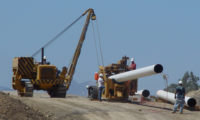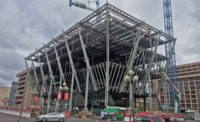High demand for private-sector renovation projects is driving revenue, while technology efficiencies are cutting costs despite the tight labor market, according to some of ENR California’s most productive specialty contracting firms.
Thirty-eight firms participated in ENR’s annual Top Regional Specialty Contractors survey and reported combined 2018 revenue for California and Hawaii of $8.03 billion; the top 38 firms from a year earlier posted 2017 regional revenue of $8.25 billion.
“The markets we serve have been extremely robust, and our ability to pursue that work has been directly related to our ability to find resources,” says Tom Sorley, president and CEO of Rosendin Electric, which ranked second overall in the list of largest specialty firms and first among the electric trades. The San Jose, Calif.-based company posted 2018 regional revenue of $835.43 million, down slightly from $865.61 million a year ago, due in part to its renewable group based in Southern California, a market with peaks and valleys. Sorley says Rosendin’s 2020 outlook is similar to 2017, with a big portion of revenue expected from renewables.
|
Related Link |
For the 12 months beginning October 2018, California added 34,400 construction jobs, a 4% jump year over year, according to the Associated General Contractors of America. “Construction employment continues to experience robust growth in most parts of the country,” says Ken Simonson, AGC’s chief economist, in a recent report. “Many firms appear to be overcoming the challenge of low unemployment rates and strong demand for labor by increasing compensation levels and investing more in training people with relatively little experience in construction.”
Meanwhile, the most recent UCLA Anderson Forecast, issued in September, notes that the pace of GDP growth in the U.S. is slowing, except in California. The forecast reports that California construction jobs are up 5% year over year and state GDP has grown 4% year over year for the first seven months of 2019.
“California is outperforming the U.S. for the same reason it has over the last decade, productivity gains through the employment of labor augmenting technology,” the Anderson report says. “Nevertheless, with recession in the air and a slowing U.S. and world economy, at some point, something will have to give.”
With unemployment rates below 4% in California’s Marin, Santa Clara and Sonoma counties, as well as in East Bay, Orange and San Diego, the state’s economic outlook remains positive despite trade tensions with China—for now. The report warns that when national growth rates begin to dip below 1%, it expects California’s growth to fall in tandem, possibly in the latter part of 2020.
“Over the next 12 months, we expect to see continued investment in new technologies across the industry that will improve safety and increase efficiency,” says Rosendin’s Sorley, the industry’s largest employee-owned firm with more than 6,000 wage earners. The firm is currently renovating Los Angeles Memorial Coliseum, a national landmark built in 1922-23 that has housed two previous Olympics games and is slated to host the 2028 Summer Olympics. “We see great growth opportunities in transportation and all areas, especially with the Olympics coming,” he says.
Michael Schwager, president of Schwager Davis Inc., whose firm ranked 36th in the California regional survey, says this year has been strong for both vertical construction and transportation projects, but the lion’s share of Schwager’s new work is shifting to the private sector.
“Our post-tensioning division deserves great credit for this year’s accomplishments in both new construction, such as the NFL [stadium] in Los Angeles, and building renovations to repurpose and extend the life of structures, such as major renovations to what is commonly called the Macy’s building in San Francisco,” says Schwager.
Guido Schwager, the company’s founder and chairman, expects California’s general-sector market conditions to hold over the next 12 months. On the horizon, he sees major state investment in transportation infrastructure—repairs, replacements and increased capacity.
“This is a vital issue that affects us all, bearing potentially tragic consequences if left unaddressed,” Schwager says. “There is sufficient political will to tackle the decommissioning or life extension of outdated nuclear power plants, an emerging market for specialty contractors, but I do hope our state will address a wider host of infrastructure needs with greater urgency.”
ENR editors named Mark III Construction, with 2018 revenue of $65.2 million, as ENR California’s Specialty Contractor of the Year, thanks to its innovative prefabrication process and its work on projects like Sacramento’s Metro Air Park and the Gallo Glass Compressed Air System in Modesto, Calif.






Post a comment to this article
Report Abusive Comment